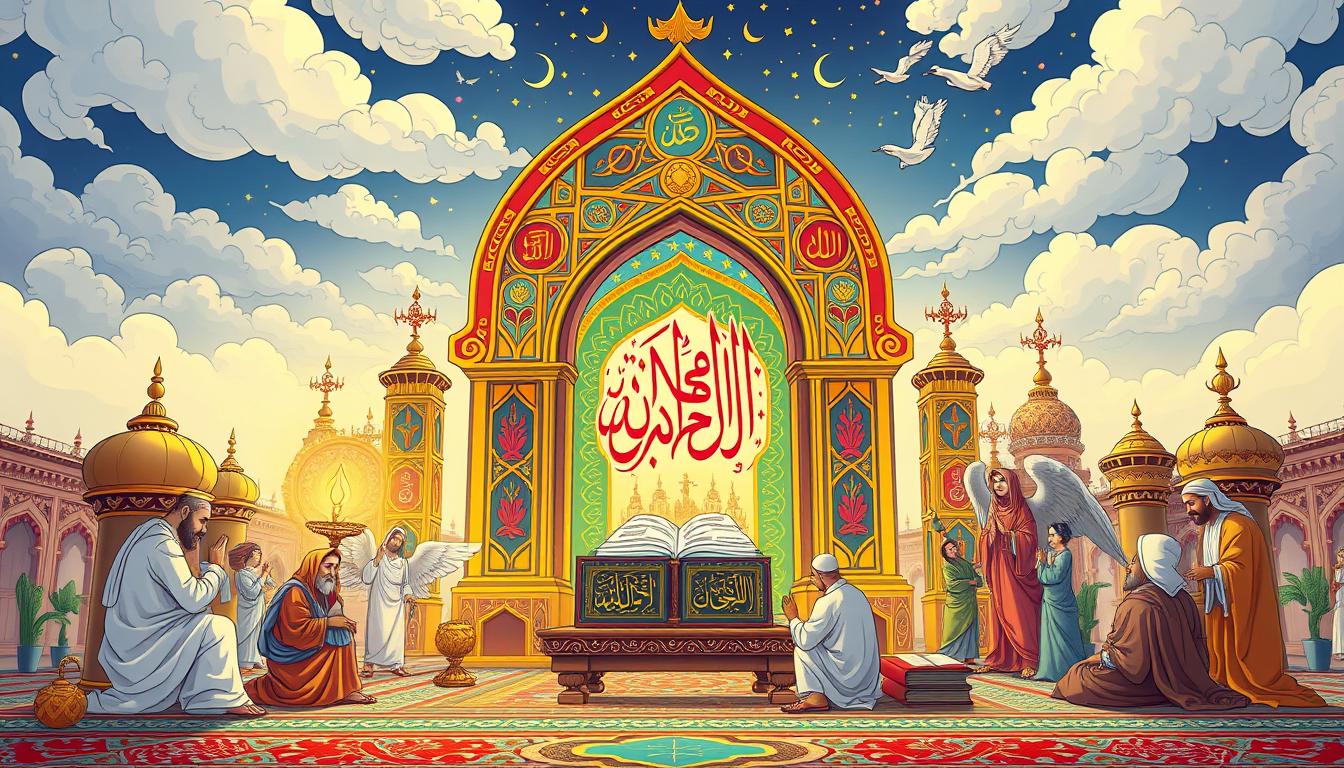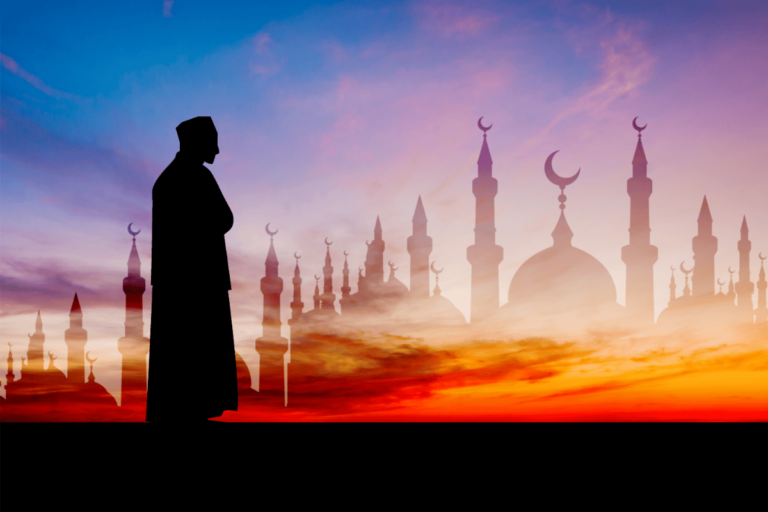10 Essential Beliefs in Islamic Theology
Have you ever thought about what guides over a billion people worldwide? The Islamic faith is rich with beliefs and practices. It’s fascinating to see how it shapes the lives of Muslims everywhere, from Jakarta to Mecca.
Islam is the second-largest religion, with 1.2 billion followers. In the United States, 7 million people follow this monotheistic faith. It goes back to Abraham and Adam, focusing on one God, Allah, and Prophet Muhammad’s teachings. The Islamic creed has six major beliefs and five pillars that guide Muslims every day.
Let’s dive into the heart of Islamic theology. We’ll look at the key beliefs that bring Muslims together. From believing in one God to the Day of Judgment, these beliefs are crucial. Join us as we explore the 10 essential beliefs that shape Islamic doctrine and influence millions worldwide.
Key Takeaways
- Islam is the second-largest religion with 1.2 billion followers globally
- The Islamic faith centers on belief in one God (Allah) and Prophet Muhammad’s teachings
- Muslims follow six major beliefs and five pillars of Islam
- Islamic theology encompasses beliefs in divine unity, angels, and the Day of Judgment
- The Quran and Sunnah form the foundation of Islamic doctrine and law
Understanding the Foundations of Islamic Faith
Islamic theology is at the heart of Muslim beliefs and actions. It guides followers every day and shapes their view of the world. These teachings have stayed the same since Islam began in the 7th century in Arabia.
The importance of Islamic theology in modern society
In today’s world, Islamic theology is very important. With about 1.8 billion Muslims worldwide, Islam is the second-largest religion. It’s also growing in America. Knowing about Islamic beliefs helps with talking between different faiths and clearing up wrong ideas.
Brief overview of Islam’s historical context
Islam started with Prophet Muhammad’s messages. It quickly spread, with Indonesia and India now having the most Muslims. There are two main groups: Sunnis (80%) and Shi’ites (20%). Both follow the Five Pillars of Islam: Shahadah (declaration of faith), Salah (prayer), Zakat (charity), Sawm (fasting), and Hajj (pilgrimage).
- Muslims pray five times daily
- Zakat involves an annual 2.5% contribution of wealth
- Ramadan fasting occurs in the ninth month of the Islamic calendar
These practices, based on Islamic theology, still influence Muslim societies. They shape laws, ethics, and social norms around the world.
The Oneness of Allah (Tawhid)
At the heart of Islamic faith lies the concept of Tawhid, the belief in the absolute oneness of Allah. This belief shapes every aspect of Muslim beliefs and practices. Tawhid is the cornerstone of Islamic theology, making it unique among religions.
Monotheism as the Cornerstone of Islamic Belief
The Islamic faith emphasizes pure monotheism. Muslims believe in one God, Allah, who is all-powerful and all-knowing. This belief is captured in the Quran, particularly in Surah Al-Ikhlas:
“Say: He is Allah, the One and Only; Allah, the Eternal, Absolute; He begets not, nor is He begotten; And there is none like unto Him.” (Quran 112:1-4)
This short chapter encapsulates the essence of Tawhid. It holds immense importance in Islamic worship. It challenges the notion of polytheism and affirms Allah’s uniqueness.
Distinguishing Islamic Monotheism
Islamic monotheism stands out for its uncompromising stance against any form of idolatry. Unlike some other faiths, Islam rejects the concept of the Trinity or any association of partners with God. This pure form of monotheism influenced Islamic civilization, uniting diverse tribes under one banner and shaping the Muslim community.
The Pillars of Islam, including the declaration of faith (Shahada), reflect this core belief in Allah’s oneness. Modern scholars continue to explore Tawhid’s implications in contemporary contexts, ensuring its relevance in today’s world.
Belief in Angels (Malaikah)
The Islamic creed includes a firm belief in angels as divine creations. These celestial beings, known as Malaikah, are key to Islam’s Articles of faith. Muslims believe angels were created from light before humans and serve as messengers of Allah.
Angels play significant roles in core Islamic teachings. They praise Allah continuously and carry out His commands without fail. Unlike humans, angels lack free will and remain sinless, embodying pure obedience to Allah’s will.
The Quran mentions several prominent angels:
- Jibril (Gabriel): Revealed the Quran to Prophet Muhammad
- Mika’il (Michael): Brings blessings and mercy
- Izrail: The Angel of Death
- Israfil: Will signal the Day of Judgment
Muslims believe angels interact with humans daily. Two angels, Raqib and Atid, record each person’s deeds for judgment in the afterlife. This belief encourages Muslims to strive for righteous actions in their daily lives.
“Whoever disbelieves in Allah, His angels, His Books, His Messengers, and the Last Day has certainly gone far astray.” – Quran 4:136
Understanding the role of angels enhances a Muslim’s faith. It reinforces the importance of living according to Islamic principles. The belief in these unseen beings serves as a reminder of Allah’s omnipresence and the significance of moral conduct in Islam.
Divine Scriptures and Revelations
Islamic doctrine places great importance on divine scriptures. The Quran, revealed over fourteen hundred years ago, is at the heart of Islamic faith. It is the base of Islamic beliefs and practices.
The Quran as the Final Revelation
In Islamic theology, the Quran is seen as the final divine message. Muslims believe it contains Allah’s direct words, given to Prophet Muhammad by the angel Jibril. The Quran guides followers of Islam, helping them understand the basics of their faith.
Recognition of Previous Scriptures
Islam recognizes earlier divine books, like the Torah, Psalms, and Gospel. The Quran confirms the core messages of these scriptures, saying they come from God. For instance, Quranic verses 5:46 and 5:48 explain and affirm the messages of previous revelations.
- Muslims believe in four holy books: the Book of Abraham, Torah, Psalms, and Gospel
- The Quran is viewed as the final revelation for all of humankind until Judgment Day
- Islam teaches that the Quran’s message is universal and timeless
Understanding these divine scriptures is key to grasping Islamic theology. The Quran’s role as the ultimate revelation shows its importance in shaping Islamic doctrine. It guides believers on their faith journey.
Prophets and Messengers in Islam
The Islamic faith has a long list of prophets and messengers from Allah. These include Adam, Noah, Abraham, Moses, and Jesus. They are key to understanding Islam.
The Role of Muhammad as the Final Prophet
Muhammad is seen as the final prophet in Islam. He is believed to be the last in a line of 124,000 prophets. The Quran talks about prophets and messengers a lot, showing their importance.
Honoring Earlier Prophets
Islam values prophets like Abraham, Moses, and Jesus. They were messengers of Allah, bringing important messages to their people. The Quran tells stories of these prophets, showing their struggles and successes.
- Abraham (Ibrahim) is known as the father of monotheism
- Moses (Musa) received the Torah (Tawrāt)
- Jesus (‘Isa) is respected as a prophet, not as divine
Islamic teachings stress the unity of God and the importance of worshiping only Allah. They also believe in the Day of Judgment. This shared message is at the heart of Islam.
10 Essential Beliefs in Islamic Theology
The Islamic creed is the heart of a Muslim’s faith. It includes the Six Articles of Faith and the Five Pillars of Islam. These beliefs guide a Muslim’s life, helping them connect with Allah and others.
The Six Articles of Faith
The Six Articles of Faith are key to Islam. Muslims believe in one God, Allah, mentioned in the Quran over 2,700 times. They also believe in angels, divine scriptures, prophets, the Day of Judgment, and divine decree. These beliefs are shared by over a billion Muslims worldwide.
The Five Pillars of Islam
The Five Pillars of Islam show faith in action. They are the declaration of faith (shahada), prayer (salat), charity (zakat), fasting during Ramadan (sawm), and pilgrimage to Mecca (hajj). These pillars help Muslims live their faith every day.
- 80% of Muslims consider the shahada as the first act of worship
- 95% perform the five daily prayers
- 70% give to the poor through zakat
- 90% fast during Ramadan
- 75% aim to make the pilgrimage to Mecca
The Fundamentals of Islam cover belief and action. By following these principles, Muslims aim to live a life of devotion and service. They seek to fulfill their purpose and gain Allah’s pleasure.
The Day of Judgment and Afterlife
Islamic doctrine teaches that every person will face judgment after death. The Quran says, “Every soul will taste death. Then to Us will you be returned.” This belief is a core part of Muslim beliefs, shaping their views on life and death.
Islamic teachings say life on Earth is short. The Quran notes, “The life of this world is merely an amusement and a diversion; the true life is in the Hereafter.” This view prompts Muslims to think about their actions and their impact on the afterlife.
The Day of Judgment in Islamic theology involves:
- Resurrection of the dead
- Accountability for one’s deeds
- Divine justice and recompense
The Quran states, “God created the heavens and the earth for a true purpose: to reward each soul according to its deeds. They will not be wronged.” This idea of divine justice is key to Islamic beliefs about the afterlife.
“The idea of judgment serves as a moral compass for Muslims, encouraging righteous living and mindfulness of one’s actions.”
In Islamic doctrine, the afterlife has two possible destinations: Paradise (Jannah) for the righteous and Hell (Jahannam) for transgressors. This belief motivates Muslims to live lives guided by God-consciousness and to do good deeds.
Divine Decree and Free Will
The Islamic faith explores the relationship between divine decree and human free will. This idea is key to Islamic teachings. It balances God’s all-knowing nature with our personal choices.
Understanding Qadar in Islamic Theology
Qadar, or divine decree, is a core idea in Islamic thought. It says Allah knows all things, past and future. The Quran, in Surah al-Kahf, says, “Let him who will, believe, and let him who will, disbelieve.” This shows that we have choices in our faith.
Balancing Predestination and Human Responsibility
Islamic teachings stress our accountability while acknowledging God’s power. The Quran, in Surah ar-Ra’d, says, “Allah changes not the condition of a people until they change that which is in their hearts.” This verse shows our role in shaping our own fate.
- The concept of al-qaḍāʾ wa al-qadar (decree and measure) reflects the dual aspects of providence
- The Preserved Tablet symbolizes the unchanging decree in Islamic theology
- Early Islamic history saw debates between Qadarites (advocates of free will) and Jabarites (believers in determinism)
Islamic teachings aim to balance God’s all-knowing nature with our free will. This balance is essential to the Islamic faith. It encourages us to make moral choices while acknowledging Allah’s ultimate power.
Conclusion
Islamic theology is the foundation of Muslim beliefs, guiding over a billion people worldwide. It shapes their spiritual journey. The basics of Islam, based on Tawhid, help followers follow Allah and interact with the world.
Islam teaches about angels and divine scriptures, giving a full view of the world. The Quran is at the heart of Muslim faith, with Prophet Muhammad’s teachings adding depth. These teachings encourage Muslims to live with purpose and morality.
Knowing about Islamic theology is key in today’s world. It helps in talking across faiths and builds respect among different religions. As we connect more, understanding Muslim beliefs can lead to more unity and cooperation.
Islamic theology focuses on obeying Allah and living ethically. It guides Muslims everywhere. It also shows us our common humanity and the values that unite us, no matter our faith or background.
Source Links
- Islam: Basic Beliefs
- Beliefs – Key beliefs in Islam – GCSE Religious Studies Revision – AQA – BBC Bitesize
- Islam | Religion, Beliefs, Practices, & Facts | Britannica
- 10 Things to Know About Islam – TeachMideast
- Chapter 1: Islamic Beliefs and Teachings
- Understanding Basic Principles of Islam – Diversity and Inclusion
- The Oneness of Allah | IslamBasics.com
- Tawhid: Unveiling Divine Oneness of Allah (Complete Insight)
- Unity of Allah (Tawhid)
- Malaikah – Muslim beliefs – Edexcel – GCSE Religious Studies Revision – Edexcel – BBC Bitesize
- Angels – Key beliefs in Islam – GCSE Religious Studies Revision – AQA – BBC Bitesize
- Angels in Islam
- Teachers Guide – Muslims | Teacher Center | FRONTLINE
- Islam’s View of God and His Revelation
- Belief in Divine Books About Islam3 min read
- Prophets and messengers in Islam
- Lesson 10: Prophets & Scriptures
- What Are The Fundamental Principles of Islam? Explained
- Islam Guide: Some Basic Islamic Beliefs
- Core Values of Islam
- Belief in Judgement Day11 min read
- Islam – Eschatology, Judgment, Afterlife | Britannica
- Free will vs. Divine decree in Islam: A brief exploration
- Predestination vs. Free Will in Islam: Understanding Allah’s Qadr | Yaqeen Institute for Islamic Research
- Islam: Basic Principles and Characteristics
- What Are the Basic Beliefs of Islam? by Don Stewart







